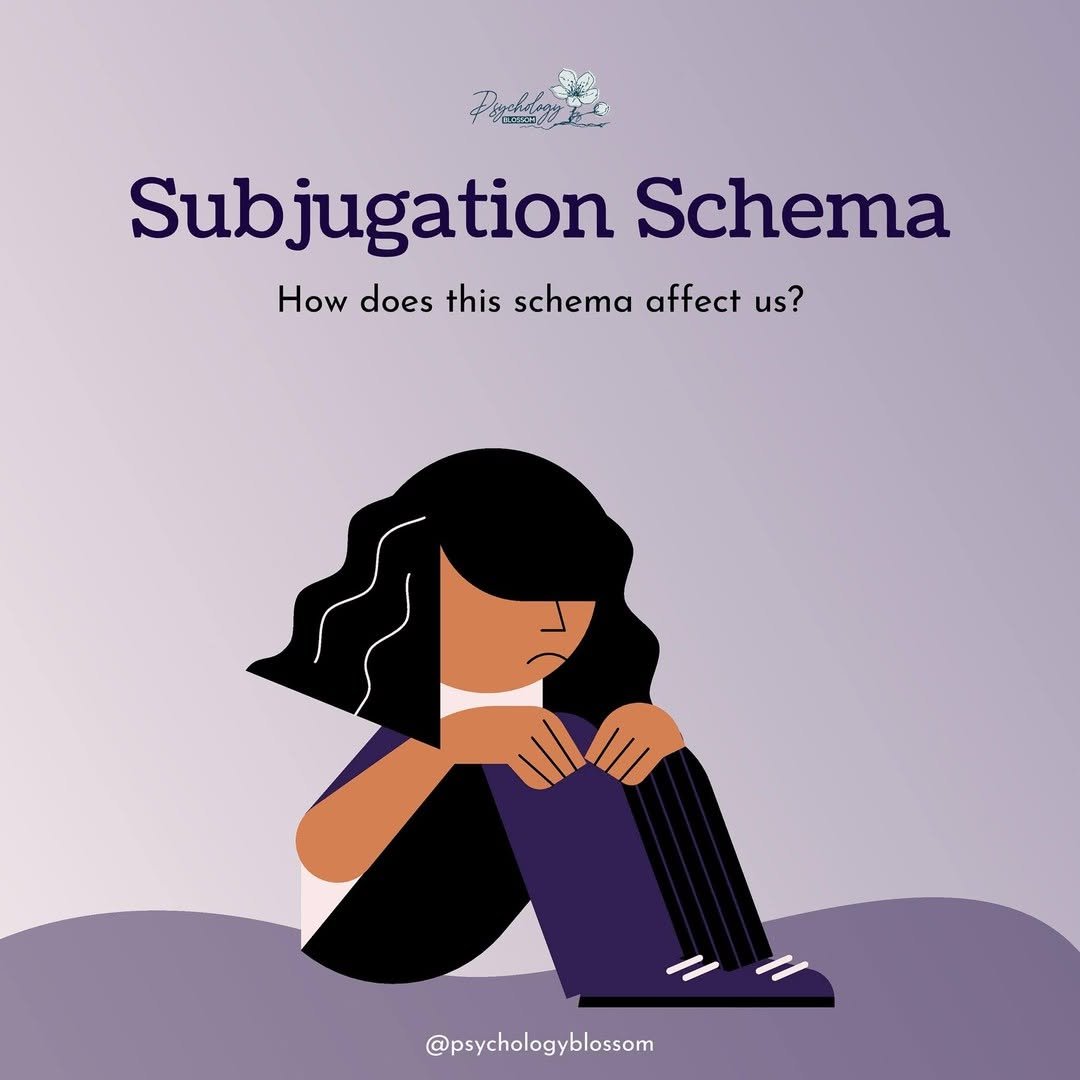Before diving into specific schemas, you might want to read our
introduction to Schema Therapy.
It provides a clear overview of the model and how schemas are understood and worked with in therapy.
Subjugation Schema: Breaking Free from Suppression and Fear
If you have developed the Subjugation Schema, you may find yourself experiencing an excessive sense of having to obey or surrender to the demands of others to avoid perceived negative consequences. You may suppress your own needs, desires, feelings, opinions, or decisions. Such behaviours are closely linked with feelings of helplessness, being trapped, or struggling to speak out and assert yourself.
Schemas are mental shortcuts we use to interpret information. When faced with a situation where you believe there might be negative consequences, the Subjugation Schema is activated. This often triggers compliance, fear-driven behaviours, or — at the other extreme — anger, passive-aggressiveness, or self-soothing through avoidance. The good news is that schemas can be changed, allowing you to move toward a healthier mindset that fosters safety, empowerment, and confidence.
Reactions Towards the Subjugation Schema
There are three ways in which you may commonly react when your Subjugation Schema is activated:
- Surrender: Other people make decisions for you, and they appear to control most aspects of your life. You comply even when it goes against your true feelings.
- Avoidance: You avoid disagreements, difficult conversations, or conflicts in order to escape anxiousness or confrontation.
- Overcompensation: You rebel strongly against authority, sometimes in unhealthy or disruptive ways, such as defiance at work or rejecting reasonable requests from friends or loved ones.
Effects of the Subjugation Schema
Living under the weight of this schema can significantly impact daily functioning and emotional health. You might ignore calls, withdraw socially, arrive late, or complete tasks half-heartedly. Instead of being true to yourself, you prioritise pleasing others to avoid conflict. Over time, this leads to a loss of empowerment, self-esteem, and confidence. You may feel invisible, unimportant, or disconnected from your authentic self.
This schema also increases the risk of unhealthy dynamics, including toxic relationships. Pent-up anger often builds beneath the surface, sometimes resulting in sudden outbursts or lashing out. Emotional repression also makes it harder to form fulfilling connections, as others never get to see the real you.
Physically, constant stress associated with suppression can contribute to fatigue, tension headaches, and other stress-related symptoms. Emotionally, it often leads to frustration, resentment, and sadness, particularly when personal needs are continuously neglected.
Risk Factors
The Subjugation Schema often develops in childhood, shaped by the following experiences:
✽ Growing up in a strict or authoritarian household: Expressing feelings or opinions may have been discouraged or punished, teaching you to stay silent to avoid harm.
✽ Experiencing trauma: Physical, emotional, or sexual abuse can reinforce the association between speaking up and fear, humiliation, or retaliation.
As a result, many people internalise the belief that their needs or feelings do not matter, or that speaking out will lead to danger. These beliefs can persist into adulthood and affect both professional and personal life.
Living with the Subjugation Schema
In adulthood, the schema often manifests in patterns such as:
- Staying in unfulfilling or toxic relationships out of fear of abandonment
- Consistently deferring to others’ opinions in group decisions
- Struggling with assertiveness at work, which may affect career growth
- Bottling up frustration until it erupts in unhealthy outbursts
These patterns may make life feel constrained, preventing individuals from pursuing their own dreams, goals, or needs. The sense of being “trapped” is a common theme among those living with this schema.
Managing Subjugation Schemas
✽ Schema Therapy
Schema Therapy is one of the most effective ways to address the Subjugation Schema. Unlike standard cognitive therapy, Schema Therapy explores early life experiences more deeply. It integrates cognitive, behavioural, experiential, and interpersonal techniques to help individuals reconnect with their authentic voice and challenge the beliefs that keep them stuck.
In therapy, clients work with a therapist to identify the roots of their schema and practice new, healthier behaviours. Sessions often involve exercises that allow clients to experience emotions more openly and safely, helping them replace fear and suppression with confidence and assertiveness.
- Rehearsal of adaptive behaviour in imagery or role-play, such as practicing assertiveness in difficult conversations
- Behavioural homework, such as stating your opinion to a trusted friend or setting a small boundary
- Involving supportive friends or family to encourage and reward adaptive behaviours
Over time, therapy reduces feelings of helplessness and teaches individuals that their voices matter. They begin to reclaim personal power, build healthier boundaries, and pursue relationships and careers aligned with their authentic selves. If you’re seeking Schema Therapy in Singapore, don’t hesitate to reach out to us. We’re here to help you take the first step toward empowerment.
For more information, watch the video attached!
We recommend This Video to those who want to learn more about the Subjugation Schema.
